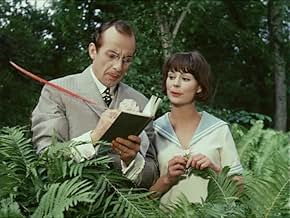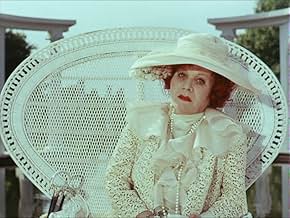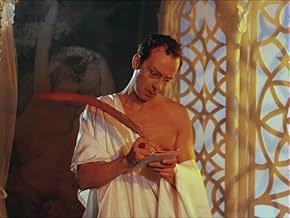IMDb RATING
5.4/10
2.6K
YOUR RATING
A critic blackmails a famous musician with his biography filled with the revelations of many of his women.A critic blackmails a famous musician with his biography filled with the revelations of many of his women.A critic blackmails a famous musician with his biography filled with the revelations of many of his women.
- Awards
- 1 nomination
Jan Blomberg
- English Radio Reporter
- (uncredited)
Lars-Owe Carlberg
- Driver
- (uncredited)
Axel Düberg
- Man in Black
- (uncredited)
Doris Funcke
- Waitress
- (uncredited)
Göran Graffman
- French Radio Reporter
- (uncredited)
Yvonne Igell
- Waitress
- (uncredited)
Ulf Johansson
- Man in Black
- (uncredited)
- Director
- Writers
- All cast & crew
- Production, box office & more at IMDbPro
Storyline
Did you know
- TriviaThis is Ingmar Bergman's first color film.
- Crazy creditsThe disclaimer at the beginning states that: "Every similarity between this film and the so-called reality has to be a misunderstanding".
- SoundtracksOrchestral Suite No. 3 D-dur (BWV 1068)
Composed by Johann Sebastian Bach
Featured review
I agree that "All These Women" is misunderstood, especially if you look at it in the context of Bergman's filmography. He had just completed the "Silence of God" trilogy, one of the deepest, most serious works in the history of cinema. So, cut the man some slack and allow him his lark, his goof, his chance to riff on fans and critics and the illusion of the exalted artist (himself), before returning to his true work with his next film, the universally praised "Persona."
I also think he was a little influenced by "8 1/2" which had come out the year before, appreciating Fellini's playfulness as well as his insight into the creative process and, of course, "all these women." Bergman will always be thought of as a somewhat austere and oft despairing artist, but thankfully we have several films that belie that, like "Smiles of a Summer Night," "The Magician," and this little oddball gem.
I also think he was a little influenced by "8 1/2" which had come out the year before, appreciating Fellini's playfulness as well as his insight into the creative process and, of course, "all these women." Bergman will always be thought of as a somewhat austere and oft despairing artist, but thankfully we have several films that belie that, like "Smiles of a Summer Night," "The Magician," and this little oddball gem.
- How long is All These Women?Powered by Alexa
Details
- Runtime1 hour 20 minutes
- Sound mix
- Aspect ratio
- 1.37 : 1
Contribute to this page
Suggest an edit or add missing content

































